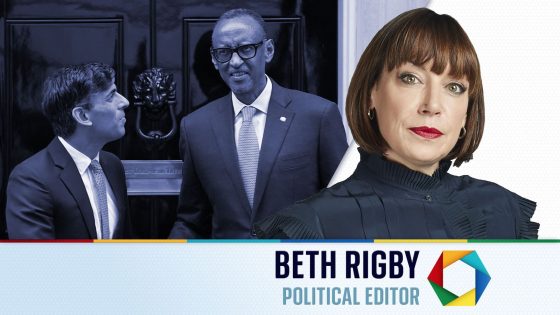It has been two years since Boris Johnson first proposed sending asylum seekers arriving in the UK to be sent to Rwanda to have their claims processed.
Since then the government has spent £240m trying to get the scheme off the ground, argued – and lost – its case to send migrants to Kigali in the highest court in the land and seen since the 1 April 2022 more than 76,000 people have arrived in the UK on small boats.
That all makes Wednesday a big moment for a government well and truly on the ropes when it comes to illegal migration.
Politics latest: Tories’ Rwanda bill defeated four times in Lords
If the Safety of Rwanda Bill finally passes through both Houses of Parliament, the prime minister will have prevailed in driving through the emergency legislation he announced last November in the face of significant opposition from some on his own side and peers in the House of Lords.
The legislation will have deemed Rwanda a safe country and disapplies sections of human rights laws. It will, the prime minister insists, finally allow London to send asylum seekers who arrived illegally in the UK to Kigali.
Even now, no-one is taking anything for granted in government.
As one senior figure involved in the legislation told me last night: “We don’t know yet whether it will pass through ping pong [where the legislation is bounced back and forth between the House of Commons and House of Lords] and get royal assent [where the monarch formally approves an act of the legislature].
“We’re not taking anything for granted given the games the Lords have been playing over the last few weeks.”
But, after what has been a ceaseless stream of criticism of the prime minister from his own party in recent months, this will undoubtedly be a moment to savour should the bill finally pass.
Faced with big rebellions from his restive backbenchers over his Rwanda plan, the defection of his former deputy party chair Lee Anderson to rival Reform, the odd public call for his resignation from his own MPs and incessant talk of a confidence vote in the face of poor polls, Mr Sunak has had a simply terrible run in office. Something going his way has got to feel good.
The prime minister will – if and when the legislation finally gains royal assent – be able to stand at a podium and say that he was true to his word.
When the Supreme Court ruled last November it was unlawful to send asylum seekers to Rwanda, the prime minister said he would secure a new treaty with Rwanda that would address the points made by the court, pass an emergency law to designate Rwanda a safe country, and insisted he was “prepared to do what is necessary” to stop any foreign court blocking deportation flights.
But those around him are mindful that this win – if it comes on Wednesday – does not automatically translate to victory.
Yes, the government has secured a new treaty to assuage some of the Court’s concerns, and passed laws to designate Rwanda safe. But getting the flights away is still not a given – and it may be in the coming weeks that the prime minister’s promise to “do whatever it takes” to get those flights away by the spring (the end of May) is tested.
“This is just the next step in getting flights off the ground,” said one senior government figure. “Lots of planning has been done, but that planning then needs to be operationalised and that will take some time and political will to get the first flight off.”
Ministers are saying flights will get away “within weeks”, while the prime minister’s official spokesman this week was careful not to reiterate the promise of Spring. There is talk around Westminster of flights getting off by June. Further delay will undoubtedly be politically explosive.
The prime minister meanwhile has doubled down on his “whatever it takes” rhetoric, saying earlier this month that controlling illegal immigration is “more important” than membership of the European Convention on Human Rights (ECHR), in a strong hint that he is ready to ignore Britain’s international obligations to enable Rwanda flights to take off.
Attempts to get flights off the ground in 2022 were thwarted when the court issued interim injunctions, so the question now is whether the prime minister would publicly defy the court if that happened again.
It would be a move that might please the right of this party and many grassroots supporters, but which could trigger a cabinet revolt of moderate Conservatives – putting the PM between a rock and hard place, again.
And even if he does manage to finally get a flight off the ground, can it be anything more than a symbolic victory when it comes to “stopping the boats”?.
For a start, boat crossings continue apace. Last Sunday saw the single biggest number of people – 534 – crossing the channel in boats in a single day this year.
Yes, the numbers were down last year, but that success is everything to do with a returns deal with Albania and co-operation with France, rather than the Rwanda scheme which is yet to send a single asylum seeker to Kigali two years after it was announced. Will getting a handful of flights taking off to Rwanda really deter those desperate to flee despotic regimes and war?
Beyond questions about the effectiveness of the deterrent, are the nuts and bolts of the plan. Conservative MPs who fought the prime minister over his Rwanda bill maintain that deportations will be bogged down in legal wrangles still and argue that the prime minister will have to withdraw from the ECHR to have success (a Pandora’s Box the PM might not feel able to open for reasons I spell out above).
Meanwhile, the recent revelation that the government is offering failed asylum seekers up to £3,000 to move to Rwanda under a voluntary scheme has incensed some Conservative MPs.
Robert Jenrick, the former immigration minister and now vocal critic of the scheme, said these payment offers were proof that the legislation doesn’t actually give the government legal powers to enforce mass removals. “Symbolic flights of people being paid to leave isn’t a strategy to stop small boats and end this national security emergency.”
And the costs of all of it is eye-watering. Whitehall’s official spending watchdog revealed last month that the plan will cost taxpayers £2m for each of the first 300 people the government deports to Kigali.
The National Audit Office said the overall cost of the scheme now stands at over £500m, while even if the UK sends no-one to Rwanda, the government has already agreed to pay £370m over the five-year deal.
It is, quips one Conservative MP, “the most expensive resettlement scheme in the world”, and it is being used by the opposition to mock the PM; this was shadow immigration minister Stephen Kinnock in the House of Commons: “Two million will get someone five trips to outer space on the Virgin Galactic spacecraft – Madam Deputy Speaker, you look impressed, and suitably so. I have calculated that someone could live for three decades on one of the world’s most expensive cruise liners…or they could even fly the prime minister’s favoured helicopter to Australia and back.”
But for all the flaws in his plan, in an election year, could it be that getting flights away gives the prime minister a political boost in the short term?
It would at least give him an answer to criticism should the boat crossings begin to spike again over the summer in an election year band allow him to argue – as with the economy and inflation pledges – that he’s executing his plan and doing what he promised the British people he’d do.
👉 Listen above then tap here to follow the Sky News Daily wherever you get your podcasts 👈
Many in his own party are bemused as to why the prime minister made Rwanda his hill to die on. But having made that choice, he has to see it through.
There are many who, for various reasons, think the scheme is doomed to fail. But he doesn’t need to be proved right in the entirety, he just needs planes in the air before Britain goes to the polls.
Source Agencies



